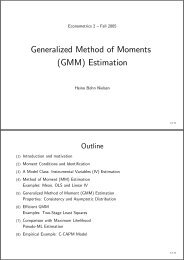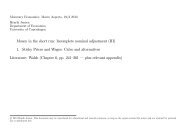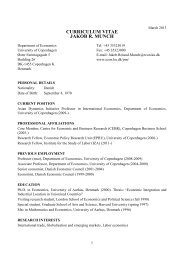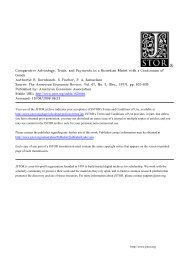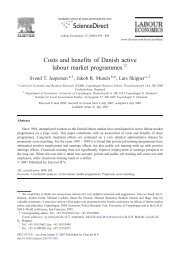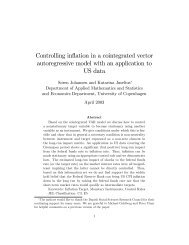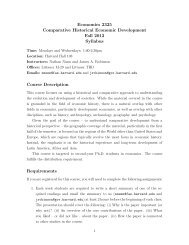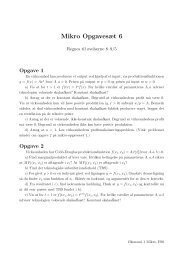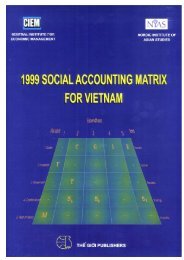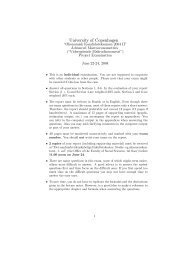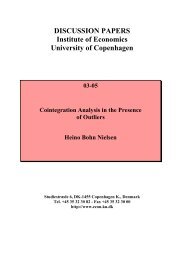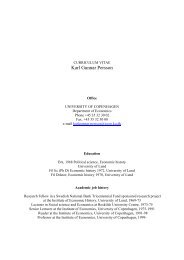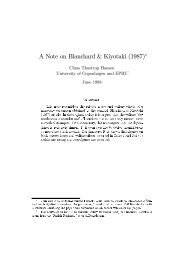- Page 1 and 2:
Nationaløkonomisk Tidsskrift 143 (
- Page 3 and 4:
OM LÆREPLADSSPØRGSMÅLET 3 serier
- Page 5 and 6:
OM LÆREPLADSSPØRGSMÅLET 5 90000
- Page 7 and 8:
OM LÆREPLADSSPØRGSMÅLET 7 0,60 0
- Page 9 and 10:
OM LÆREPLADSSPØRGSMÅLET 9 givet
- Page 11 and 12:
OM LÆREPLADSSPØRGSMÅLET 11 over
- Page 13 and 14:
OM LÆREPLADSSPØRGSMÅLET 13 angiv
- Page 15 and 16:
OM LÆREPLADSSPØRGSMÅLET 15 Dette
- Page 17 and 18:
OM LÆREPLADSSPØRGSMÅLET 17 Tabel
- Page 19 and 20:
OM LÆREPLADSSPØRGSMÅLET 19 hverv
- Page 21 and 22:
OM LÆREPLADSSPØRGSMÅLET 21 Ikke
- Page 23 and 24:
OM LÆREPLADSSPØRGSMÅLET 23 didat
- Page 25 and 26:
OM LÆREPLADSSPØRGSMÅLET 25 Litte
- Page 27 and 28:
MILJØMODELLER TIL ADAM 27 ling i D
- Page 29 and 30:
MILJØMODELLER TIL ADAM 29 Tekniske
- Page 31 and 32:
MILJØMODELLER TIL ADAM 31 LADA kan
- Page 33 and 34:
MILJØMODELLER TIL ADAM 33 NH 3 54%
- Page 35 and 36:
MILJØMODELLER TIL ADAM 35 Tabel 4.
- Page 37 and 38:
MILJØMODELLER TIL ADAM 37 8%). End
- Page 39 and 40:
MILJØMODELLER TIL ADAM 39 portsyst
- Page 41 and 42:
MILJØMODELLER TIL ADAM 41 Konkurre
- Page 43 and 44:
Nationaløkonomisk Tidsskrift 143 (
- Page 45 and 46:
BØR VIRKSOMHEDER OPLYSES OM SANDSY
- Page 47 and 48:
BØR VIRKSOMHEDER OPLYSES OM SANDSY
- Page 49 and 50:
BØR VIRKSOMHEDER OPLYSES OM SANDSY
- Page 51 and 52:
BØR VIRKSOMHEDER OPLYSES OM SANDSY
- Page 53 and 54:
BØR VIRKSOMHEDER OPLYSES OM SANDSY
- Page 55 and 56:
BØR VIRKSOMHEDER OPLYSES OM SANDSY
- Page 57 and 58:
BØR VIRKSOMHEDER OPLYSES OM SANDSY
- Page 59 and 60:
BØR VIRKSOMHEDER OPLYSES OM SANDSY
- Page 61 and 62:
BØR VIRKSOMHEDER OPLYSES OM SANDSY
- Page 63 and 64:
BØR VIRKSOMHEDER OPLYSES OM SANDSY
- Page 65 and 66:
Nationaløkonomisk Tidsskrift 143 (
- Page 67 and 68:
THE CONSUMPTION OF ALCOHOL IN THE S
- Page 69 and 70:
THE CONSUMPTION OF ALCOHOL IN THE S
- Page 71 and 72:
THE CONSUMPTION OF ALCOHOL IN THE S
- Page 73 and 74:
THE CONSUMPTION OF ALCOHOL IN THE S
- Page 75 and 76:
THE CONSUMPTION OF ALCOHOL IN THE S
- Page 77 and 78:
THE CONSUMPTION OF ALCOHOL IN THE S
- Page 79 and 80:
THE CONSUMPTION OF ALCOHOL IN THE S
- Page 81 and 82:
Nationaløkonomisk Tidsskrift 143 (
- Page 83 and 84:
THE EFFECT OF LABOUR MARKET CONDITI
- Page 85 and 86:
THE EFFECT OF LABOUR MARKET CONDITI
- Page 87 and 88:
THE EFFECT OF LABOUR MARKET CONDITI
- Page 89 and 90:
THE EFFECT OF LABOUR MARKET CONDITI
- Page 91 and 92:
THE EFFECT OF LABOUR MARKET CONDITI
- Page 93 and 94:
THE EFFECT OF LABOUR MARKET CONDITI
- Page 95 and 96:
THE EFFECT OF LABOUR MARKET CONDITI
- Page 97 and 98:
THE EFFECT OF LABOUR MARKET CONDITI
- Page 99 and 100:
THE EFFECT OF LABOUR MARKET CONDITI
- Page 101 and 102:
THE EFFECT OF LABOUR MARKET CONDITI
- Page 103 and 104:
THE EFFECT OF LABOUR MARKET CONDITI
- Page 105 and 106:
DEBAT OG KOMMENTARER 105 det astron
- Page 107 and 108:
DEBAT OG KOMMENTARER 107 gælder ik
- Page 109 and 110:
DEBAT OG KOMMENTARER 109 prisstivhe
- Page 111 and 112:
DEBAT OG KOMMENTARER 111 keynesiane
- Page 113 and 114:
DEBAT OG KOMMENTARER 113 outside in
- Page 115 and 116:
DEBAT OG KOMMENTARER 115 Begrebet '
- Page 117 and 118:
DEBAT OG KOMMENTARER 117 men ikke k
- Page 119 and 120:
DEBAT OG KOMMENTARER 119 som et ana
- Page 121 and 122:
DEBAT OG KOMMENTARER 121 Appendiks:
- Page 123:
BOGANMELDELSER 123 J. A. Schumpeter
- Page 126 and 127:
126 NATIONALØKONOMISK TIDSSKRIFT 2
- Page 128 and 129:
128 NATIONALØKONOMISK TIDSSKRIFT 2
- Page 130 and 131:
130 NATIONALØKONOMISK TIDSSKRIFT 2
- Page 132 and 133:
132 Det fremgår, at minimering af
- Page 134 and 135:
134 NATIONALØKONOMISK TIDSSKRIFT 2
- Page 136 and 137:
136 3 2 1 0 -1 -2 -3 -4 1986 1988 1
- Page 138 and 139:
138 Ymax Fmax Flag NATIONALØKONOMI
- Page 140 and 141:
140 NATIONALØKONOMISK TIDSSKRIFT 2
- Page 142 and 143:
142 1,50 1,25 1,00 0,75 0,50 0,25 N
- Page 144 and 145:
144 NATIONALØKONOMISK TIDSSKRIFT 2
- Page 146 and 147:
146 3 2 1 0 -1 -2 -3 -4 Filtrerede
- Page 148 and 149:
148 NATIONALØKONOMISK TIDSSKRIFT 2
- Page 150 and 151:
150 Dahl, C., H. Hansen og J. Smidt
- Page 152 and 153:
152 Autoregressiv model. (Ymax = 4)
- Page 154 and 155:
154 25 20 15 10 5 Official discount
- Page 156 and 157:
156 NATIONALØKONOMISK TIDSSKRIFT 2
- Page 158 and 159:
158 NATIONALØKONOMISK TIDSSKRIFT 2
- Page 160 and 161:
160 25 20 15 10 5 0 -5 Figure 3. Re
- Page 162 and 163:
162 ry of monetary regimes - some l
- Page 164 and 165:
164 Table A.1. Danish interest rate
- Page 166 and 167:
166 continued ... NATIONALØKONOMIS
- Page 168 and 169:
Nationaløkonomisk Tidsskrift 143 (
- Page 170 and 171:
170 NATIONALØKONOMISK TIDSSKRIFT 2
- Page 172 and 173:
172 Average UIB rate pr. year 100 9
- Page 174 and 175:
174 NATIONALØKONOMISK TIDSSKRIFT 2
- Page 176 and 177:
176 NATIONALØKONOMISK TIDSSKRIFT 2
- Page 178 and 179:
178 NATIONALØKONOMISK TIDSSKRIFT 2
- Page 180 and 181:
180 Per cent 40 35 30 25 20 15 10 5
- Page 182 and 183:
182 Table 2. Trend adjusted differe
- Page 184 and 185:
184 NATIONALØKONOMISK TIDSSKRIFT 2
- Page 186 and 187:
186 den, Finland, Austria, Germany,
- Page 188 and 189:
188 continued ... NATIONALØKONOMIS
- Page 190 and 191:
190 1.000 kr 150 100 50 0 -50 -100
- Page 192 and 193:
192 NATIONALØKONOMISK TIDSSKRIFT 2
- Page 194 and 195:
194 NATIONALØKONOMISK TIDSSKRIFT 2
- Page 196 and 197:
196 Forsørgerkvote 150 140 130 120
- Page 198 and 199:
198 NATIONALØKONOMISK TIDSSKRIFT 2
- Page 200 and 201:
200 NATIONALØKONOMISK TIDSSKRIFT 2
- Page 202 and 203:
202 Timer 2200 2000 1800 1600 1400
- Page 204 and 205:
204 Pct. af BNP 5 0 2001 2011 2021
- Page 206 and 207:
206 Pct. 18 16 14 12 10 8 6 4 2 0 2
- Page 208 and 209:
208 NATIONALØKONOMISK TIDSSKRIFT 2
- Page 210 and 211:
210 Procent af BNP 8 4 0 2001 2021
- Page 212 and 213:
212 Pct. 18 16 14 12 10 8 6 4 2 0 2
- Page 214 and 215:
214 NATIONALØKONOMISK TIDSSKRIFT 2
- Page 216 and 217:
216 NATIONALØKONOMISK TIDSSKRIFT 2
- Page 218 and 219:
218 NATIONALØKONOMISK TIDSSKRIFT 2
- Page 220 and 221:
220 NATIONALØKONOMISK TIDSSKRIFT 2
- Page 222 and 223:
222 NATIONALØKONOMISK TIDSSKRIFT 2
- Page 224 and 225:
224 NATIONALØKONOMISK TIDSSKRIFT 2
- Page 226 and 227:
226 NATIONALØKONOMISK TIDSSKRIFT 2
- Page 228 and 229:
228 NATIONALØKONOMISK TIDSSKRIFT 2
- Page 230 and 231:
Nationaløkonomisk Tidsskrift 143 (
- Page 232 and 233:
232 NATIONALØKONOMISK TIDSSKRIFT 2
- Page 234 and 235:
234 NATIONALØKONOMISK TIDSSKRIFT 2
- Page 236 and 237:
236 Bundskatteprocent 5,5 Figur 1.
- Page 238 and 239:
238 NATIONALØKONOMISK TIDSSKRIFT 2
- Page 240 and 241:
240 NATIONALØKONOMISK TIDSSKRIFT 2
- Page 242 and 243:
242 1999. Scandinavian Economic His
- Page 244 and 245:
244 NATIONALØKONOMISK TIDSSKRIFT 2
- Page 246 and 247:
246 NATIONALØKONOMISK TIDSSKRIFT 2
- Page 248 and 249:
248 NATIONALØKONOMISK TIDSSKRIFT 2
- Page 250 and 251:
Nationaløkonomisk Tidsskrift 143 (
- Page 252 and 253:
252 NATIONALØKONOMISK TIDSSKRIFT 2
- Page 254 and 255:
254 NATIONALØKONOMISK TIDSSKRIFT 2
- Page 256 and 257:
256 NATIONALØKONOMISK TIDSSKRIFT 2
- Page 258 and 259:
Nationaløkonomisk Tidsskrift 143 (
- Page 260 and 261:
260 NATIONALØKONOMISK TIDSSKRIFT 2
- Page 262 and 263:
262 NATIONALØKONOMISK TIDSSKRIFT 2
- Page 264 and 265:
264 NATIONALØKONOMISK TIDSSKRIFT 2
- Page 266 and 267:
266 NATIONALØKONOMISK TIDSSKRIFT 2
- Page 268 and 269:
268 NATIONALØKONOMISK TIDSSKRIFT 2
- Page 270 and 271: 270 NATIONALØKONOMISK TIDSSKRIFT 2
- Page 272 and 273: 272 NATIONALØKONOMISK TIDSSKRIFT 2
- Page 274 and 275: 274 NATIONALØKONOMISK TIDSSKRIFT 2
- Page 276 and 277: 276 NATIONALØKONOMISK TIDSSKRIFT 2
- Page 278 and 279: 278 Pct. 0,20 0,15 0,10 0,05 0,00 -
- Page 280 and 281: 280 NATIONALØKONOMISK TIDSSKRIFT 2
- Page 282 and 283: 282 NATIONALØKONOMISK TIDSSKRIFT 2
- Page 284 and 285: 284 NATIONALØKONOMISK TIDSSKRIFT 2
- Page 286 and 287: 286 NATIONALØKONOMISK TIDSSKRIFT 2
- Page 288 and 289: 288 NATIONALØKONOMISK TIDSSKRIFT 2
- Page 290 and 291: 290 NATIONALØKONOMISK TIDSSKRIFT 2
- Page 292 and 293: 292 NATIONALØKONOMISK TIDSSKRIFT 2
- Page 294 and 295: 294 NATIONALØKONOMISK TIDSSKRIFT 2
- Page 296 and 297: 296 NATIONALØKONOMISK TIDSSKRIFT 2
- Page 298 and 299: 298 rapport, København. Velfærdsk
- Page 300 and 301: 300 NATIONALØKONOMISK TIDSSKRIFT 2
- Page 302 and 303: 302 NATIONALØKONOMISK TIDSSKRIFT 2
- Page 304 and 305: 304 NATIONALØKONOMISK TIDSSKRIFT 2
- Page 306 and 307: 306 NATIONALØKONOMISK TIDSSKRIFT 2
- Page 308 and 309: 308 NATIONALØKONOMISK TIDSSKRIFT 2
- Page 310 and 311: 310 NATIONALØKONOMISK TIDSSKRIFT 2
- Page 312 and 313: 312 NATIONALØKONOMISK TIDSSKRIFT 2
- Page 314 and 315: 314 hold til individuelle handelspa
- Page 316 and 317: 316 ters, and a comprehensive cover
- Page 318 and 319: 318 tations. An understanding of th
- Page 322 and 323: 322 NATIONALØKONOMISK TIDSSKRIFT 2
- Page 324 and 325: 324 NATIONALØKONOMISK TIDSSKRIFT 2
- Page 326 and 327: 326 Consumption y 0 B 2 A 2 U 2 U 2
- Page 328 and 329: 328 NATIONALØKONOMISK TIDSSKRIFT 2
- Page 330 and 331: 330 NATIONALØKONOMISK TIDSSKRIFT 2
- Page 332 and 333: 332 Income gain from entry T+B Y Y-
- Page 334 and 335: 334 NATIONALØKONOMISK TIDSSKRIFT 2
- Page 336 and 337: 336 NATIONALØKONOMISK TIDSSKRIFT 2
- Page 338 and 339: 338 NATIONALØKONOMISK TIDSSKRIFT 2
- Page 340 and 341: 340 NATIONALØKONOMISK TIDSSKRIFT 2
- Page 342 and 343: 342 Percent 60 50 40 30 20 10 0 196
- Page 344 and 345: 344 NATIONALØKONOMISK TIDSSKRIFT 2
- Page 346 and 347: 346 NATIONALØKONOMISK TIDSSKRIFT 2
- Page 348 and 349: 348 Fixed work cost Disposable inco
- Page 350 and 351: 350 NATIONALØKONOMISK TIDSSKRIFT 2
- Page 352 and 353: 352 NATIONALØKONOMISK TIDSSKRIFT 2
- Page 354 and 355: 354 NATIONALØKONOMISK TIDSSKRIFT 2
- Page 356 and 357: 356 NATIONALØKONOMISK TIDSSKRIFT 2
- Page 358 and 359: 358 Eissa, N., H. J. Kleven, and C.
- Page 360 and 361: 360 NATIONALØKONOMISK TIDSSKRIFT 2
- Page 362 and 363: 362 NATIONALØKONOMISK TIDSSKRIFT 2
- Page 364 and 365: 364 NATIONALØKONOMISK TIDSSKRIFT 2
- Page 366 and 367: 366 NATIONALØKONOMISK TIDSSKRIFT 2
- Page 368 and 369: 368 Table 2. Results of the estimat
- Page 370 and 371:
370 NATIONALØKONOMISK TIDSSKRIFT 2
- Page 372 and 373:
372 NATIONALØKONOMISK TIDSSKRIFT 2
- Page 374 and 375:
374 NATIONALØKONOMISK TIDSSKRIFT 2
- Page 376 and 377:
376 Appendix 2 Estimation results o
- Page 378 and 379:
378 Table A3.1. Results of the esti
- Page 380 and 381:
Nationaløkonomisk Tidsskrift 143 (
- Page 382 and 383:
382 NATIONALØKONOMISK TIDSSKRIFT 2
- Page 384 and 385:
384 NATIONALØKONOMISK TIDSSKRIFT 2
- Page 386 and 387:
386 NATIONALØKONOMISK TIDSSKRIFT 2
- Page 388 and 389:
388 NATIONALØKONOMISK TIDSSKRIFT 2
- Page 390 and 391:
390 NATIONALØKONOMISK TIDSSKRIFT 2
- Page 392 and 393:
392 t H LUK > (,n=1) (2.2) I det f
- Page 394 and 395:
394 NATIONALØKONOMISK TIDSSKRIFT 2
- Page 396 and 397:
396 Den første matrix af forklaren
- Page 398 and 399:
398 64% 38% 6% 3,3% Figur 4. Anvend
- Page 400 and 401:
400 NATIONALØKONOMISK TIDSSKRIFT 2
- Page 402 and 403:
402 NATIONALØKONOMISK TIDSSKRIFT 2
- Page 404 and 405:
404 NATIONALØKONOMISK TIDSSKRIFT 2
- Page 406 and 407:
406 NATIONALØKONOMISK TIDSSKRIFT 2
- Page 408 and 409:
408 NATIONALØKONOMISK TIDSSKRIFT 2
- Page 410 and 411:
410 NATIONALØKONOMISK TIDSSKRIFT 2
- Page 412 and 413:
412 (II) En koncentreret ligevægt
- Page 414 and 415:
414 NATIONALØKONOMISK TIDSSKRIFT 2
- Page 416 and 417:
Nationaløkonomisk Tidsskrift 143 (
- Page 418 and 419:
418 NATIONALØKONOMISK TIDSSKRIFT 2
- Page 420 and 421:
420 Table 1. Number of marriages. N
- Page 422 and 423:
422 NATIONALØKONOMISK TIDSSKRIFT 2
- Page 424 and 425:
424 NATIONALØKONOMISK TIDSSKRIFT 2
- Page 426 and 427:
426 NATIONALØKONOMISK TIDSSKRIFT 2
- Page 428 and 429:
428 NATIONALØKONOMISK TIDSSKRIFT 2
- Page 430 and 431:
430 Baseline hazard function 0,1000
- Page 432 and 433:
432 mic Circumstances, Oxford Bulle
- Page 434 and 435:
434 NATIONALØKONOMISK TIDSSKRIFT 2
- Page 436 and 437:
436 uncertain after-tax rate of ret
- Page 438 and 439:
438 i i v12 1 + v212 + v313 (14)
- Page 440 and 441:
440 NATIONALØKONOMISK TIDSSKRIFT 2
- Page 442 and 443:
442 NATIONALØKONOMISK TIDSSKRIFT 2
- Page 444 and 445:
444 NATIONALØKONOMISK TIDSSKRIFT 2
- Page 446 and 447:
446 NATIONALØKONOMISK TIDSSKRIFT 2
- Page 448 and 449:
Nationaløkonomisk Tidsskrift 143 (



